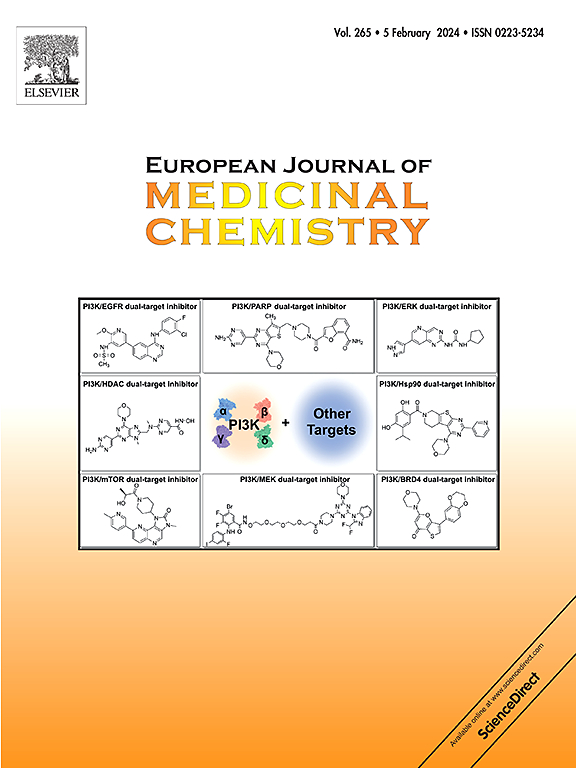Novel trimethyl lock-based prostate-specific membrane antigen targeted Conjugates: Design, synthesis, and biological activity evaluation
IF 6
2区 医学
Q1 CHEMISTRY, MEDICINAL
引用次数: 0
Abstract
Prostate cancer, a leading malignancy in men globally, faces challenges such as poor targeting, systemic toxicity, and drug resistance. This study developed an innovative multifunctional linker based on the trimethyl lock (TML) system, enabling parallel conjugation of key modules for targeted drug delivery. The linker integrates three functional components: (1) a targeting module (ACUPA), (2) a drug module (docetaxel, DTX), and (3) a trigger module (GSH-responsive disulfide bond). This “three-in-one” design allows flexible adjustment of physicochemical properties. Two conjugates were designed and formulated into nanoparticles. Physicochemical characterization demonstrated their excellent self-assembly and GSH-responsive release properties. Cellular assays showed that the conjugates exhibited comparable inhibitory activity against PSMA-positive 22Rv1 cells to DTX, while their activity against PSMA-negative PC 3 cells was lower. Cellular uptake confirmed higher internalization in 22Rv1 cells than in PC 3 cells. In vivo, low-dose PEG3.4k-TML-DTX nanoparticles (10 mg/kg) achieved tumor inhibition rates similar to free DTX without causing weight loss, demonstrating favorable biosafety. This study provides a novel strategy for targeted chemotherapy with tumor microenvironment responsiveness and low toxicity.

新型三甲基锁基前列腺特异性膜抗原靶向偶联物:设计、合成和生物活性评价
前列腺癌是全球男性的主要恶性肿瘤,面临着诸如靶向性差、全身毒性和耐药性等挑战。本研究开发了一种基于三甲基锁(TML)系统的创新多功能连接体,实现了关键模块的平行偶联,用于靶向给药。该连接器集成了三个功能组件:(1)靶向模块(ACUPA),(2)药物模块(docetaxel, DTX)和(3)触发模块(gsh响应二硫键)。这种“三合一”设计允许灵活调整物理化学性质。设计了两种共轭物并配制成纳米颗粒。理化表征表明其具有良好的自组装和gsh响应释放特性。细胞实验表明,该偶联物对psma阳性22Rv1细胞的抑制活性与DTX相当,而对psma阴性pc3细胞的抑制活性较低。细胞摄取证实22Rv1细胞的内化程度高于pc3细胞。在体内,低剂量PEG3.4k-TML-DTX纳米颗粒(10 mg/kg)达到了与游离DTX相似的肿瘤抑制率,而不会造成体重减轻,显示出良好的生物安全性。本研究为肿瘤微环境反应性和低毒性的靶向化疗提供了一种新的策略。
本文章由计算机程序翻译,如有差异,请以英文原文为准。
求助全文
约1分钟内获得全文
求助全文
来源期刊
CiteScore
11.70
自引率
9.00%
发文量
863
审稿时长
29 days
期刊介绍:
The European Journal of Medicinal Chemistry is a global journal that publishes studies on all aspects of medicinal chemistry. It provides a medium for publication of original papers and also welcomes critical review papers.
A typical paper would report on the organic synthesis, characterization and pharmacological evaluation of compounds. Other topics of interest are drug design, QSAR, molecular modeling, drug-receptor interactions, molecular aspects of drug metabolism, prodrug synthesis and drug targeting. The journal expects manuscripts to present the rational for a study, provide insight into the design of compounds or understanding of mechanism, or clarify the targets.

 求助内容:
求助内容: 应助结果提醒方式:
应助结果提醒方式:


